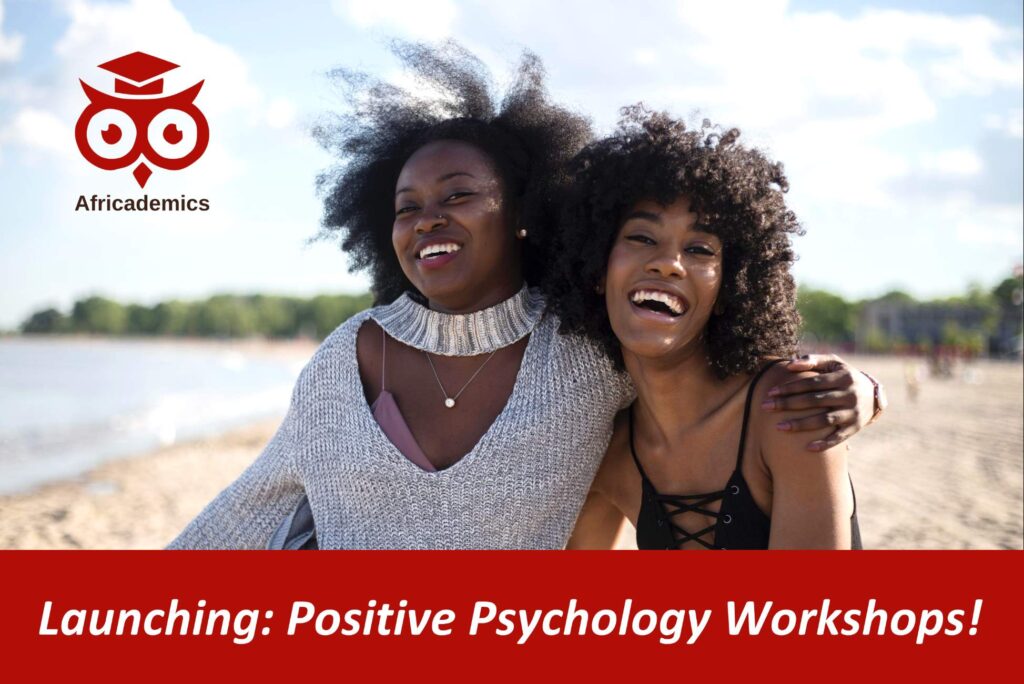By Lena Gronbach and Laura van Gass

At Africademics we are committed to supporting scholarship seekers and applicants in and from Africa in their scholarship journey. Since 2019 we have been sharing scholarship information on a daily basis and we also offer personal support through our Scholarship Ambassador Programme.
In addition to our existing programmes, we are excited to announce the launch of a new project which will be led by our new intern, Laura van Gass. Laura, originally from South Africa, is a Master’s student in Positive Psychology at Tilburg University in the Netherlands. As part of her internship with Africademics, she will be offering a series of workshops to help our Africademics Scholarship Ambassadors unlock their growth mindset, identify their character strengths, learn self-compassion and manage stress – all with a view on assisting you in your scholarship search!
What is positive psychology?
When most people hear the word “Psychology”, they think about treating mental disorders like depression or schizophrenia. Yes, psychology plays a very important role in helping people live with these disorders, but psychology does not stop there, just as mental health does not stop there.
The absence of a mental illness does not mean someone has good mental health, just as the presence of a mental illness does not eliminate all aspects of mental well-being for that person. For example, someone might not be diagnosed with a depressive disorder, but they are still greatly unhappy with their lives. The same goes for someone diagnosed with a mental disorder, that does not mean that they don’t enjoy time spent with family and friends or that they are unable to find their jobs meaningful.
That’s where positive psychology comes in!
Positive psychology is the scientific study of what makes life worth living. It places importance on working with the positive traits or aspects of a person that will increase their well-being. Positive psychology is complementary to the traditional disorder focused approaches to psychology, by focussing on the positive areas of human functioning and providing us with a more balanced understanding of mental health.
Positive psychology pursues the promotion of well-being in many ways and has developed scientifically proven strategies and tools to do so. These are called Positive Psychology Interventions (PPI’s). PPIs are mainly focused on raising positive emotions, thoughts, and behaviour. In doing so, PPI’s do not only help people live their best lives but also help them to keep on doing so despite negative events they might have to face.
We invite our Scholarship Ambassadors to explore positive psychology with us, and the benefits it could bring to their and your life. In our positive psychology workshops, we will focus on things like developing a growth mindset, identifying your character strengths, and practising self-compassion and positive stress management, just to name a few.
Workshop 1: Growth Mindset
Knowing that you are able to develop and improve your talents, intelligence and skills give people hope, but research has found that truly believing this makes it even more true. This is called having a growth mindset. People who believe others, and themselves, can grow and change have growth mindsets. Whereas people with fixed mindsets believe that their talents, strengths and intelligence is unchangeable, thereby limiting themselves by living as if this is true.
In our growth mindset workshop, you’ll learn about the difference between these mindsets. You’ll learn how to change the limiting beliefs that are keeping you in your comfort zone, and how to step into your growth zone to work on becoming the person you are capable of being.
Workshop 2: Character strengths
Character strengths are the positive parts of your personality that impact how you think, feel, and behave. There are 24 different character strengths that we all possess to varying degrees. Knowing what your top character strengths are and using them in your everyday life means that you are able to play to your strengths, reach your goals, perform to your fullest and feel energized and authentic whilst doing so.
In our character strengths workshop, you’ll get the opportunity to get to know yourself a little better. You will identify your top strengths, and learn how to grow them and how to use them to your advantage.
Workshop 3: Self-compassion
Self-Compassion entails being kind towards yourself, especially in difficult situations. It’s about understanding that all your experiences are a part of being human and accepting your failures in a non-judgmental way. As well as having the courage to acknowledge when you are struggling and having the desire to heal oneself when suffering. It is a lot like the type of kindness we show to our friends or family when they are struggling, but this time it is directed at ourselves. We all too often neglect the responsibility of caring for ourselves, especially when we are preoccupied with caring for others. Self-compassion has been linked to many psychological benefits, for instance, increasing resilience, satisfaction with life, mental well-being, motivation, and interpersonal relationships.
We all need kindness, so let’s start showing it to ourselves. Join us in our self-compassion workshop to learn more about self-compassion and what you can do to increase it in your life.
Workshop 4: Positive stress management
Stress is a normal response to challenges or danger. It is useful in small doses as it helps us cope with difficulties by triggering physical and emotional responses in our bodies that allows us to, for example, stay awake for longer or run faster from danger. However, when this stress is ongoing, or chronic, it has a negative impact on our emotions, body, and behaviour. Unfortunately, in society today, chronic stress has become the norm and experiencing burnout is a reality for at least half of the population.
If stress is a reality in your life, join us in our positive stress management workshop. We will use evidence-based PPIs to teach you coping strategies to better deal with stress, help you see stress differently and build resilience for facing future stressors.
